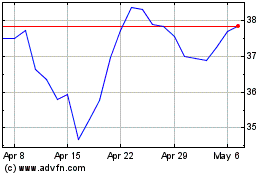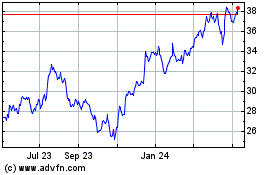By Julia-Ambra Verlaine and Nick Timiraos
The deepening Wall Street rout is adding to pressure on U.S.
banks, as the retreat of investors from risky assets saddles
lenders with securities they are struggling to sell at desired
prices.
The crunch has been evident in the share prices of the largest
U.S. financial firms, which have fallen 30% or more in many cases
over the past month. Citigroup Inc. dropped 8.6% on Wednesday,
extending its decline to 36%, nearly doubling the drop in the
S&P 500.
Now the pain is spreading, as fears about the coronavirus's
impact on economic activity intensify and as an oil-price war brews
between Saudi Arabia and Russia. Traders, analysts and regulators
are monitoring markets for signs that problems there are spilling
over to hurt the real economy, by constraining lending.
Executives in meetings with President Trump said Wednesday the
industry remains in ruddy good health. Brian Moynihan, chief
executive of Bank of America Corp., said banks are in "great
position" on capital and liquidity. Michael Corbat, chief executive
of Citigroup, said "this is not a financial crisis."
But amplifying the uncertainty Wednesday was news from across
industries. Boeing Co. drew down a $13.8 billion loan with many
banks, and companies owned by some private-equity firms are being
encouraged to take similar action, according to news reports. Such
moves could further stretch funding and balance-sheet concerns at
banks.
"When markets come under duress as they have over the past
couple of weeks, asset prices are pushed to levels where you begin
to see margin calls and other internal activity that is not always
visible on the surface," said Daniel Deming, a managing director at
Chicago-based KKM Financial.
The most surprising development for traders Wednesday: the sharp
decline in the price of U.S. Treasury securities, which until this
week had consistently risen significantly on days when U.S. stocks
were falling. The price declines sent yields higher after dropping
to record lows and were fueled in part by banks selling U.S.
government securities to reduce inventories and raise cash. Rates
are low enough that Wednesday's action itself didn't hurt banks,
but the unusual nature of the move raised eyebrows.
People familiar with some of the largest securities-dealing
banks said many firms bought corporate bonds as prices fell last
week, but those purchases resulted in some banks having balance
sheets that executives deemed too large. With prices barely having
recovered in many markets, some banks chose to sell Treasurys
instead, in part reflecting their significant appreciation in
recent weeks.
Another area of worry: the rising price difference between a
Treasury bond and the equivalent future, also known as the
"cash-future basis." Traders said the dislocation was the worst
since 2008 and reminded some of an even more acute episode in 2001
following the 9/11 attacks. Analysts and portfolio managers
scrutinize the basis because signs of stress there can foretell
lending pullbacks.
Trading conditions in the Treasury market "are certainly
deteriorating, but it's not miserable," said Jim Vogel, an
interest-rate strategist at FHN Financial. "The system is just
overloaded" as investors digest rapid changes in sentiment, news
about possible stimulus from Washington and financing
challenges.
Similarly, the spread between the two-year Treasury yield and
the overnight indexed swap, a derivative used by banks to hedge
exposures created in lending and investing, has risen this week,
including an increase of 0.05 percentage point on Wednesday.
"Swap spreads are showing early signs of dealer balance-sheet
funding pressures," said Priya Misra, head of global rates strategy
at TD Securities.
Mortgage lenders said a lack of bidding activity for mortgage
bonds in credit markets led rates to rise, with quoted prices on
the 30-year fixed-rate mortgage increasing to 4.375%, more than a
percentage point higher than the record lows it had plumbed last
week.
The share-price declines and funding-market stresses don't
necessarily indicate that Wall Street is questioning the viability
of the banking system, as it did in the 2008 crisis. Following that
episode, banks significantly boosted their capital cushions and
access to cash under regulatory scrutiny and financial
legislation.
But changes in regulation and shifts in the economy have reduced
the market's capacity to absorb volatility, many traders say, and
the declines in bank-related markets in part reflect concerns about
how a test of the new regime might play out for some lenders.
The cost to insure bank bonds against default rose sharply,
suggesting investors are worried about a funding pinch. The cost of
insuring against default on Citigroup debt for five years rose to
$115,000 annually from $40,000 this week, according to FactSet,
though it remains well below the panicked pricing seen in 2008.
Adding to those concerns were additional ructions in the market
for repos, the repurchase agreements that serve as a short-term
funding mechanism for many financial firms.
The Federal Reserve Bank of New York said Wednesday it would
ratchet up the amount of cash it injects into money markets
beginning Thursday through collateralized loans known as repurchase
agreements, or repos. It increased the amount of overnight repo
offerings to $175 billion from $150 billion. It will also offer $50
billion in one-month loans on Thursday and again on March 16 and
March 23.
Those transactions will boost to more than $500 billion the
amount of cash the Fed is providing through such repo lending,
using a mix of overnight, two-week and four-week loans, expanding
its $4.2 trillion asset portfolio to levels last seen in 2017. Repo
lending outstanding from the Fed dropped to a low of $126.2 billion
on Feb. 28.
Mr. Vogel said the Federal Reserve could help calm markets by
increasing its purchases of Treasury bills, which it has been doing
at a pace of $60 billion per month since separate problems first
flared in short-term lending markets last fall. That would free up
resources from broker-dealers to finance other securities rather
than Treasury bill auctions.
Mr. Vogel also said the Fed could slow the runoff of its
holdings of mortgage-backed securities as another pressure-release
valve. Currently it allows up to $20 billion in mortgage bonds to
mature from its $4.2 trillion bond portfolio every month.
Get an early-morning coronavirus briefing each weekday, plus a
health-news update Fridays: Sign up here.
Write to Julia-Ambra Verlaine at Julia.Verlaine@wsj.com and Nick
Timiraos at nick.timiraos@wsj.com
(END) Dow Jones Newswires
March 11, 2020 20:24 ET (00:24 GMT)
Copyright (c) 2020 Dow Jones & Company, Inc.
Bank of America (NYSE:BAC)
Historical Stock Chart
From Mar 2024 to Apr 2024

Bank of America (NYSE:BAC)
Historical Stock Chart
From Apr 2023 to Apr 2024
